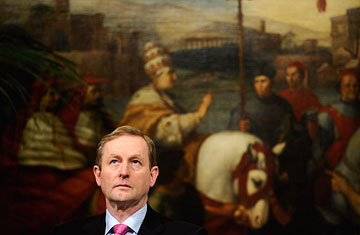
Ireland's Prime Minister Enda Kenny looks on during a joint press conference with his Italian counterpart after their meeting at Palazzo Chigi in Rome on Feb. 23, 2012
Democracy is an awkward concept for the European Union, especially during the ongoing crisis over bailing out indebted euro-zone nations. Although all 27 E.U. members are democracies, none of the bloc's institutions have directly elected leaders. And despite the extraordinary measures taken over the past two years to clear up the debt crisis and tighten the euro-zone's fiscal rulebook, European leaders have skipped lightly over the democratic implications of their actions. So Ireland's announcement this week that it will hold a referendum on the new German-pushed fiscal rules for the euro-zone's members represents a rare dose of democracy in the current debate over the future of the currency — but one that is unlikely to be welcomed in European capitals.
The E.U. leaders gathering for yet another summit in Brussels on Thursday and Friday are not expected to betray their feelings when they greet the Taoiseach, as the Irish prime minister, Enda Kenny, is known, but they will doubtless be seething at the idea that Ireland's vote on the euro-zone's so-called "Fiscal Compact" could add to the ongoing euro turmoil. Kenny announced the referendum after receiving legal advice that it was constitutionally required for the treaty, which was agreed upon at an E.U. summit in December. No date has been set for the Irish vote, but officials say it will take at least three months to organize.
"I am confident that the Irish people will do what is necessary," Kenny told the Irish parliament on Tuesday. "In the end, what this will come down to is a vote for economic stability and economic recovery." But the announcement adds yet more uncertainty to the E.U.'s crisis response. In fact, it prompted an immediate fall in the euro against the dollar, reflecting investor concerns that the planned fiscal treaty could fail.
For the Irish, this could be a defining moment in their relationship with the euro. Although polls currently give supporters of the pact a slim lead — with 40% of Irish voters in favor and 36% opposed — there is ample time for the tide to turn. The European debt crisis has hit Ireland particularly hard, with Dublin having to implement more than $40 billion in austerity measures to reduce its budget deficit. House prices fell 17% last year and the hopes of an economic recovery this year are receding: the IMF forecasts growth of only 0.5% in Ireland, but Citigroup believes the Irish economy will shrink between 0.5% and 1%. A 'no' vote on the referendum would not be enough to derail the treaty — it can be implemented with the support of 12 of the 17 euro-zone members — but, crucially for Ireland, it would deny the country access to the euro-zone's new bailout fund. In December, Irish Finance Minister Michael Noonan warned that a referendum on the treaty would effectively be a vote on staying in the euro club.
Ireland has a knack for throwing the rest of the E.U. into uncertainty with its fickle voters. The country has twice rejected E.U. treaties in recent years, only to eventually approve them when put to a re-vote in second referendums. In 2008, the E.U. was plunged into crisis when the Lisbon treaty — designed to overhaul the E.U. rulebook — was rejected by Irish voters. It was approved in a second vote 18 months later.
The rest of Europe may not be so patient with Ireland — or its referendums — this time around. In November, when Greek Prime Minister George Papandreou suggested putting the E.U. bailout deal to a referendum in his country, he was met with howls of outrage from European leaders like French President Nicolas Sarkozy. Eventually, Papandreou was forced not only to drop his referendum plans, but to resign. So far, the European response to Ireland's planned referendum has been relatively muted. German Chancellor Angela Merkel hasn't commented on the vote, but the budget and finance spokesman in Merkel's party, Michael Meister, said bluntly, "Whoever doesn't accept the treaty has no protection from the ESM bailout fund. If the Irish people think they don't need any ESM protection they can, of course, reject the fiscal treaty."
For all the uncertainty that Ireland's vote brings, it's perhaps more significant that it is the only one being held on the Fiscal Compact. The treaty has deep implications for national sovereignty, shifting the euro-zone's monetary union inexorably toward a fiscal union. The treaty dictates that each euro-zone member send its tax and spending plans to European officials for review, and there will be automatic sanctions against those countries that overspend. Given the extent of the new policies, the E.U. shouldn't reject democratic measures such as the Irish referendum, says Nicolas Véron, senior fellow at Breugel, a Brussels-based economic think tank. "The way Europe deals these issues is not sustainable in the long run," he says. "We need a more streamlined and effective way for citizens to express themselves. If we are serious about a more integrated E.U. policy framework, we have to offer more accountability and representation."
Of course, Ireland's referendum is not the only threat to the euro. Greece is still hovering on the brink of default, and earlier this week, euro-zone chief Jean-Claude Juncker suggested that a third Greek bailout might be needed and German Interior Minister Hans-Peter Friedrich suggested that Greece should leave the euro zone altogether — the first time a member of the German government has openly called for such a radical step. European officials may grumble that an Irish vote disrupts their carefully laid plans, but with so much at stake already, a little democracy might actually reinforce a wider sense of legitimacy to Europe's crisis response.
